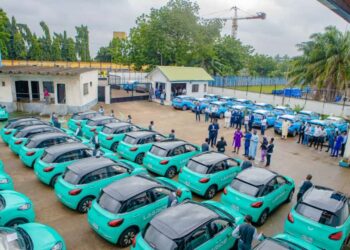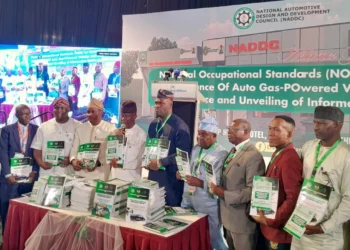Nigeria’s transportation sector stands at a turning point as the country confronts the global shift toward cleaner, smarter, and more sustainable mobility.
Nairametrics spoke to Richard Akpodiete, a Nigerian-born automotive expert and Certified Quality Specialist currently based in Germany.
He holds a Bachelor’s degree in Mechanical Engineering from Cyprus International University and a Master’s in Automotive Management from EBS University School of Business & Law in Oestch-Winkel, Germany.
With professional experience at INEOS Automotive in Böblingen, Akpodiete now specialises in Quality Maturity Management and sustainability.
In this interview, he outlines how Nigeria can build a clear path toward hybrid and electric vehicle adoption, strengthen local assembly, and develop the infrastructure and policies needed to support modern mobility.
He also draws lessons from Europe’s cycling, e-scooter, and urban transport systems that could guide Nigeria toward a healthier and more efficient future.
Nairametrics: When you look at the future of mobility in Nigeria, what areas of infrastructure development strike you as the most critical for supporting new technologies and transport systems?
Richard Akpodiete: One of the major things that can support adaptation is safety and infrastructure. For instance, Germany has set a high benchmark for safety standards and access networks.
For Nigeria, it’s not just about the vehicles we put on the road but also about prioritising cycling infrastructure, e-bikes, e-scooters, and safe pedestrian lanes. These are essential to creating a network that encourages the adoption of alternative mobility solutions while ensuring the safety of users.
Nairametrics: Indigenous vehicle assembly has been part of Nigeria’s automotive policy for some time. How is local assembly shaping the industry today, and what role could it play in adapting to global changes?
Richard Akpodiete: Local assembly is growing, but there are gaps. Currently, most indigenous assemblers rely heavily on imported parts from China and India. To truly adapt to global changes, Nigeria needs to develop a local tier-one and tier-two supplier ecosystem. Finance is also a major barrier—establishing a modern automotive facility can cost billions of dollars. But with proper investment in local production, expertise, and partnerships, Nigeria could start owning a larger share of what it assembles, reducing dependency on imported parts and strengthening its automotive sector for the long term.
Nairametrics: The government has launched several initiatives around the automotive industry and sustainable mobility. Which of these efforts do you see as most impactful, and where is more work needed?
Richard Akpodiete: Some initiatives, like the Lagos BRT electric buses and partnerships between state governments and private EV assemblers, are promising. However, the adoption is still minimal, and we need stronger investments in localisation—producing parts and vehicles within the country rather than relying on imports. Incentives and policy frameworks also need strengthening to encourage logistics companies and individual users to switch to low-emission and hybrid vehicles.
Nairametrics: How do other countries approach long-term planning and sustainability in mobility, and what lessons could Nigeria draw?
Richard Akpodiete: Countries like Germany emphasise long-term infrastructure planning. They create versatile energy stations for fuel, CNG, electricity, and even solar energy. Incentives, regulations, and urban planning all work together to make adoption smooth. Nigeria can learn from this by mapping out energy infrastructure, regulating vehicle emissions, and ensuring policies support gradual adoption rather than abrupt transitions. Hybrid vehicles, for example, are an effective transitional technology—they allow users to switch between fuel and electric depending on the journey.
Nairametrics: What policies or incentives could help Nigerians embrace alternatives like EVs, e-scooters, or shared mobility more easily?
Richard Akpodiete: Incentives are key. Policies could include fleet charges that penalise high-emission vehicles, speed regulations for urban areas, and subsidies for electric and hybrid vehicles. For scooters and e-bikes, defined parking zones and app-based monitoring can encourage proper usage while creating jobs for battery maintenance and system operations. These measures help people transition gradually without overwhelming existing systems.
Nairametrics: When you think about support infrastructure, what would you say are the most important elements Nigeria needs to prioritise?
Richard Akpodiete: Nigeria needs a well-mapped and versatile network of energy stations—charging stations for EVs, stations for CNG, solar, and other alternatives. Digital connectivity for vehicles, smart traffic monitoring, and integrated transport hubs are also crucial. Urban designs should accommodate separated lanes for BRT buses, bicycles, and scooters to reduce congestion and improve mobility efficiency.
Nairametrics: How do you view the role of regulatory agencies like the Nigeria Customs Service and Federal Road Service Corps in shaping the automotive industry’s future?
Richard Akpodiete: Agencies like Customs and FRSC play a critical role in regulating vehicle quality and lifespan. For instance, Customs should ensure that vehicles entering Nigeria meet international standards. FRSC and related agencies could implement roadworthiness certification, digital tracking of vehicles, and proper enforcement of fines for non-compliant vehicles. These measures directly impact carbon emission reduction goals and the adoption of sustainable transport solutions.
Nairametrics: From an urban planning and city design perspective, what changes are essential to build a future-ready mobility system in Nigerian cities?
Richard Akpodiete: Urban planning must integrate architects, engineers, automotive experts, and tech specialists. Measures like segregated lanes for public transport, micro-mobility solutions within estates or university campuses, and congestion control strategies are critical. Limiting the number of informal transport vehicles like Danfo or Keke can reduce congestion while enabling safer, more efficient urban mobility.
Nairametrics: Living in Europe, what lessons from e-scooters and biking systems can be adapted to Nigeria?
Richard Akpodiete: The best adaptation is in controlled environments like university campuses and estates. E-scooters and bikes operate within programmed zones, monitored via apps, ensuring proper parking and usage. These systems can create last-mile solutions and improve access while also generating employment for maintenance and battery replacement.
Nairametrics: Beyond vehicles, how could active transport options like cycling or walking influence public health and movement patterns?
Richard Akpodiete: Prioritising pedestrian lanes and bike paths encourages physical activity, reduces dependency on cars, and can lower congestion. For instance, in Germany, people often cycle to train stations, park their bikes, and take public transport. Similar models in Nigeria, even over short distances, could enhance public health and mobility efficiency.


























Comments 1